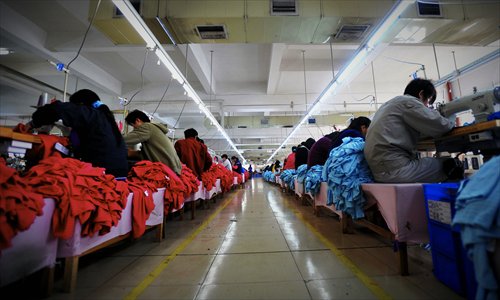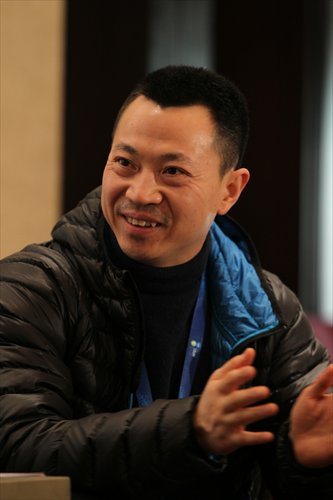Private entrepreneur’s letter to premier becomes online sensation
In an unprecedeted open letter addressed to Premier Li Keqiang, Wu Hai, an ordinary private entrepreneur, vented the frustration of 20 years of dealing with government bureaucracy in China. His letter struck a chord with other enterpreneurs. The Chinese government has recently taken strong actions to address the issue with 798 forms of administrative approval canceled or delegated to lower-level governments in 2014. In an economic seminar last week, Premier Li said that creativity and a willingness to explore are the backbone of Chinese economy, and vowed a "revolution" in streamlined government processes.

Employees work on production lines at a private-owned clothing factory in Foshan, Guangdong Province. Photo: IC

Top: Wu Hai, CEO and founder of the Crystal Orange Hotel Group. Photo: CFP
Sometimes, one man's simple letter can change the fate of many.
On March 23, Wu Hai, 46 year-old CEO and founder of the Crystal Orange Hotel Group, sat down to write down in words thoughts that had been on his mind for many years. The end product was a public letter addressed to Chinese Premier Li Keqiang, which Wu posted to his public Wechat account.
In the space of one night, Wu's letter was read more than 40,000 times. The next day, his was the most searched name on Baidu.
In his letter, Wu highlighted the difficulties faced by private companies, and decried the bureaucracy of local governments and the police. These companies, mostly small and medium-sized, regularly encounter issues with the authorities, which Wu believes are a result of inappropriate government policies and corruption at the grass-roots level.
Wu was inspired to write the letter when he saw the news that Premier Li Keqiang had visited the State Administration for Industry and Commerce in March to encourage the continued streamlining of administrative procedures. The premier's goal spoke to precisely the problems Wu has encountered while running his company.
Wu's Wechat letter was meant to be read and understood by common people, so he used slang and everyday language. In it, he summed up several key problems he's observed in 20 years of doing business in China.
He emphasized that private businesses' social status is still greatly inferior to that of State-owned enterprises. Private companies still find it very hard to get fair treatment from government agencies, and to get loans from State-owned banks. In his letter, Wu claimed that an average businessman spends almost half of his working time dealing with government agencies and bureaucracy.
Overlap in agencies' jurisdiction is confusing for entrepreneurs. Orders come from various departments, seemingly at random. He has to please every one of them. If one agency is unhappy, they can fine companies, or even shut them down.
Wu cited one particularly vivid example of unclear rules in his letter: A package of potato chips served to a guest at his hotel was a few days past its expiration date. The guest complained to the authorities. His hotel was slapped with a 30,000 yuan ($4,840) fine. The authorities cited a rule saying that "for offenses less than 10,000 [yuan in total value], [offenders] should be charged a fine of between 2,000 and 50,000 yuan."
Complicated government rules create grey areas where bribery thrives and empowers shady middlemen. In his letter, Wu spoke about getting his hotel redecorated. The local construction commission ordered him to hire its designated construction tendering company, jacking up his costs and adding another two months to the process.
He also called out public security agencies. In the hotel business, privacy is vital for guests. However, some local police knock on the doors of guest rooms at midnight without prior notification to conduct "security checks."
Wu talked about his feelings that there are too many agencies, each with its own rules and orders. He related a conversation with one tax scholar: "If government made clear tax regulations, how could they ask you for more taxes?"
He still remembers one scene vividly: In one city where his hotel operates, a government official called more than 30 company heads to a meeting. The official said his agency wanted to stage an event, and asked all the companies present for "sponsorship," with larger firms asked to give more.
"For businesses in the hotel and entertainment industries, if [the local government] isn't satisfied with you, they won't say it directly. But they will use legal methods to check you. A little problem in a hotel, they can shut down the whole hotel," he said.
Wu said after the publication of the public letter, he had been approached by some senior government officials who wanted to get his suggestions. He has also used his post as a member of the Chinese People's Political Consultative Conference of Beijing's Dongcheng district to make his views known.
He says that, for a market economy, these are pressing issues. He suggests tackling them through a system of checks and balances. Entrepreneurs should have power to evaluate law enforcement agencies, government agencies should have clear fines for businesses that break the rules, and government agencies should be fair and independent in order to avoid middlemen and bribery. And their responsibilities and obligations should be clear, to avoid messy administrative overlap.
"As an entrepreneur with a mid-sized business, I have seen or heard many problems. I hope the environment can be better, give these businesses an easier time in the future. The core issue is creating a reasonable business environment to let companies focus on their business and on innovation. This is the key to relieving burdens on companies," he said.
Lightening the load
The central government has taken strong actions to tackle these issue. According to Xinhua News Agency, as of the end of 2014, 798 items requiring government administrative approval had been canceled or delegated to lower-level governments, or more than one third of the total number of approvals in effect as of March 2013.
Also, after reforms were implemented last March by China's State Administration for Industry and Commerce with the goal of simplifying business registration, China saw a 48 percent increase in new business registrations, according to the administration's statistics.
In a Sina survey, 52 percent of respondents said that administrative procedures are becoming more transparent, while 48 percent said that bribery is on the wane.
This new hands-off approach has seen the government make large strides in shifting from an authoritative entity to a supervisory presence. During an inspection tour in Tianjin's Binhai district, Premier Li watched 109 official seals being decommissioned, a move meant to represent a significant reduction in the number of approvals needed to do business in the district.
On March 24, in a bid to clarify governmental responsibilities and obligations, the CPC Central Committee and the State Council published guidelines for reforming local governments' administrative checklists.
In an example of where the central government would like things to go, East China's Zhejiang Province last year implemented the country's first provincial "administrative powers list." The list sorts the province's administrative powers into 10 categories, with the responsibilities and obligations of all the provincial government's departments open to public scrutiny, with the exception of confidential matters. The list's release is meant to make the provincial government's operation and provision of services more transparent to individuals, businesses and other organizations.
"In some villages in Zhejiang, villages have drawn up charts to show the workflow for [government] procedures. Villagers, village chiefs all stick to these workflows, and village committees are supervising implementation. It is a simple method but very useful. The power lists clarifies the boundaries of each department's responsibility, and is an efficient way to cut down on wasted time and corruption in government processes," said Feng Xingyuan, a professor of economics at the Chinese Academy of Social Sciences.
Accelerating opening
In a study conducted by the China Household Financing Survey and China PnR, a mobile payments solutions company, around 40 percent of small and medium Chinese enterprises lost money in the third quarter last year.
"For small and medium enterprises, access to credit is the number one issue. Many get financing from friends and relatives. For them, getting money from State banks is very difficult, because they don't have the necessary connections. Reducing taxes is good [way to help them]," said Feng.
In Zhejiang Province's Wenzhou, long famous as a hotbed of private entrepreneurs, the local government and private businesses are working together to address the financial bottleneck facing SMEs. On March 26, the nation's first privately owned and operated bank Wenzhou Minshang Bank, officially began operation. Its 13 shareholders are all private entrepreneurs in Wenzhou, and its chairman is a noted local entrepreneur. He is the first private entrepreneur to serve as the chairman of a privately owned bank.
"There will be more such banks opening [in the future]. They understand local markets and have local knowledge, and will be able to provide comprehensive services to local SMEs. Through guidance and regulation, the government will act as a 'gatekeeper,' providing the policy support private enterprises need to develop," Li Zhan, vice-president at the China Association of Small and Medium Enterprises, told the Global Times.
It seems that the voices of Wu Hai and many private entrepreneurs have been heard by the premier. On April 14, at a seminar he hosted, Premier Li said that Chinese citizens are hardworking and wise, adding that as long as the government provides them sufficient space to explore and create, Chinese people will release enormous creativity.
'Rational' patriotism
Many entrepreneurs read Wu's letter. They felt he had spoken the words they feared to say. Some cried when they read his letter. He received thousands of responses on WeChat.
After the publication of Wu's letter, Sina.com conducted a survey in which 83 percent of respondents said that government agencies have too much power; 82 percent of respondents said that overlaps in government authority is still a problem; 67 percent said that excessive fines and punishments for companies are a problem; while 72 percent felt that bribe-seeking is still a major problem.
Wu is excited by the response to his letter, but also worried that its wording might backfire. During his interview with the Global Times, he stressed that he doesn't want the media to misinterpret his message. As he puts it, he is just a 'rational patriot,' seeking to do good by his country.
Newspaper headline: Viral reform